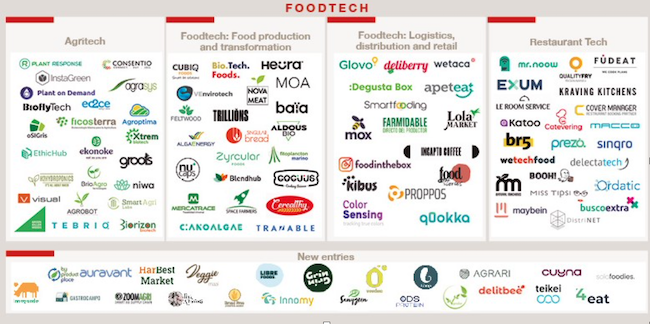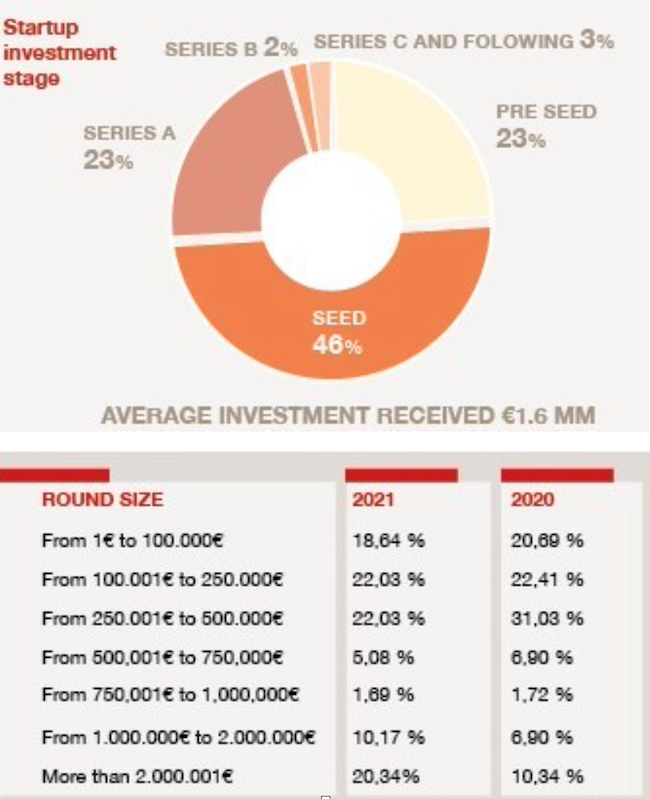We are living in an innovative and accelerated era that invites every industry to evolve the way they’ve been working. The world is facing environmental problems that need to be addressed, such as pollution, global warming, waste disposal, among others. Startups, which nowadays are part of the most disruptive layer of the food-tech ecosystem, consider sustainability and efficiency as fundamental factors when contemplating new ways of developing their value proposition, by employing the most advanced technologies.
The Agri-food Chain englobes everything, from agriculture production to food consumption, which has a global size of €14.5 trillion and is considered as the next great opportunity in the financial sphere. Meanwhile, the term Foodtech refers to a broad sector, destined to be the next future of food, which involves all economic actors that associate innovation with the activities of the food industry, also from food production to food consumption.
Spain is Europe's fourth-largest agri-food power and tenth in the world. It contributes 10% to the national GDP, generating more than 2.8 million jobs, directly and indirectly. In 2021 we could see how the Spanish food-tech ecosystem, as well as investments in startups, have tripled (695m€), placing Spain among the global leaders in this matter. This figure sets food-tech as the second investment category in startups, behind only transportation. We are aiming to become one of the leader nations in Foodtech worldwide, and we are achieving this through our ecosystem.
Spain’s Foodtech Ecosystem
The Spanish ecosystem is in the top 5 European ecosystems with more investment in Foodtech following Germany, UK, France and Netherlands. This ecosystem englobes national, regional and local government agencies, business associations, technology centres, science parks, universities, incubators and accelerators, and of course, startups.
For example, in regard to government agencies, ICEX Spain Export and Investments is launching this spring the second edition of Desafía program, an international immersion program held in the Netherlands and supported by Next Generation EU funds, which has the objective to support the internalization and fast growth of the Spanish Foodtech ecosystem.
Next, in terms of technological centres in Spain, which play a fundamental role in the innovation development of different startups, we have The National Center for Food Safety (CNTA) which has been a key partner in innovative programs such as Spain Foodtech and Mylkcubator.
Also, big industries, such as Europastry and Pascual, with their programs Baking the Future and Mylkcubator, respectively, are leading the way in the development of new technologies, working with national and international startups to help them scale up their solutions and ensuring a sustainable food system.
Furthermore, Innovation hubs, incubators, and accelerators are driving the creation and growth of Foodtech startups. For instance, Spain FoodTech Startups Program, an acceleration program promoted by Eatable Adventures and supported by ICEX Spanish government leg for Export and Investment and the National Center for Food Technology and Safety (CNTA), has attracted more than 200 start-ups, including foreign entrepreneurs looking to establish their headquarters in Spain. Here, 5 startups (Cocuus, MOA Foodtech, Proppos, Innomy, and H2hydroponics) were selected to receive a personalized acceleration plan with access to CNTA´s technological support, which multiplied their value by 6.3 after the program ended.
Also, we have seen the emergence of new incubators at the national level specific to the Foodtech sector, such as Forward Fooding, powered by the Food & Food Tech Innovation Hub in Barcelona and hosted by Talent Garden.
Likewise, The Hop, Estrella Galicia's open innovation ecosystem has grown and evolved from being a Collaborative Entrepreneurship Program towards an Open Innovation Ecosystem after three editions between Spain and Brazil.
Moreover, during the last few years, events which focused on giving visibility to the Foodtech sector have emerged, as is the case of Food4Future in Bilbao and Veggie2business in Madrid focusing on alternative proteins.
A number of international fairs, such as Fruit Attraction and Meat Attraction, also showcase technologies applied to the food value chain, with dedicated areas such as the Biotech Attraction conference cycle and the Innovation Hub which gathers all the product innovations.
Spain’s Foodtech Startups
In 2021 each area of the Agri-food Value Chain has witnessed relevant and balanced growth in the percentage of Spain’s foodtech startups that they embroil. The growth projects located in the agritech sector must be highlighted, they went up from 17% in 2020 to 24% in 2021. Meanwhile, the food production & transformation sector represents 35%, logistics & distribution 24%, and lastly, restaurant tech represents 17%.
On the other hand, regarding the rankings of the main innovative sectors, this year’s leading projects are oriented to product innovation, at 24%, which includes everything related to new ingredients, from their production to their transformation of finished products. This is closely followed by the “Direct to Consumer” models at 22% and finally, the digitization of the field, at 12%.
All of them encompass various sources of innovation and technologies, such as biotechnology, robotics, blockchain, artificial intelligence, machine learning, and big data.Thanks to these technologies, the Foodtech ecosystem is getting closer to facing the sustainability challenges presented by the agri-food industry.
Currently, we can see how numerous Spanish startups cover every part of the value chain in the market, implementing these types of modern technologies. For example, in the Agritech sector, Ekonoke, a Madrid-based startup, is working on harvesting its first indoor hop crop and is aiming to supply a substantial part of the Galician brewery's (Estrella Galicia) hop needs by the end of 2023. On the other hand, in the Food production & transformation sector, we have Biotech Foods, a Spanish startup dedicated to the development of cultured meat using animal cells samples to grow the desired tissue in a controlled environment. Lastly, recent news in the restaurant tech sector reports that the German food delivery company Delivery Hero has acquired another 40% of Glovo's shares, providing a new twist to the delivery sector.
Below, you can find a map with the main Spanish Foodtech startups, selected by the degree of investment and innovation, classified in the different phases of the chain according to our taxonomy.

.png.transform/rendition-xs/image_image%20(1).png)





